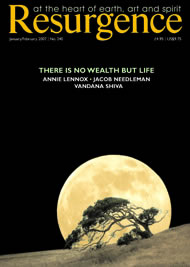I HAD THE immense privilege of meeting Thomas Berry several years ago: I had been deeply influenced by his books The Dream of the Earth and The Great Work. The latter had just been published, and I went to see him on the pretext of writing a piece for Resurgence about the book (Resurgence 204). But my main motive for seeking to meet him was a feeling that here is a truly great teacher, one who brings both great learning and great wisdom to his perspective on our current predicament.
I was not mistaken. Berry welcomed me with immense generosity, meeting me at the airport and proposing immediately that we go for beer. We chatted about our religious background – his as a Catholic monk and priest, mine as an English nonconformist – gently getting to know each other.
I will never forget our encounter the following morning. We had agreed to meet for breakfast at my hotel, so early next day I found somewhere to sit outside and waited for him in the gentle sunshine. He arrived, sat down beside me and immediately launched into an account of the nature of the Universe. As we sat on this low wall outside the very ordinary Holiday Inn, he showed me that the Universe, and every being that derives from it, has a psychic-spiritual as well as a physical-material reality, an intangible inner form as well as a tangible physical structure, and that these two aspects must always go together and be understood together.
This means, as you will read in his books, that he sees the Universe as a community of subjects rather than a collection of objects. The place of the human is as a member of this community of beings in the Universe, and more immediately on the planet Earth. The Universe and the Earth are primary, the human and human affairs always derivative – yet we act as if to subordinate the entire planet to our own concerns. At the same time, the human activates one of the deepest dimensions of the Universe – its capacity to reflect on itself and celebrate itself through conscious self-awareness.
This book takes forward themes that Berry has developed through his life, in particular the links between religion, cultural history, scientific discovery and the story of the Universe unfolding over cosmic time. In some ways it repeats earlier writings, but it is none the worse for that because earlier insights are often expressed here more sharply and succinctly.
He looks the current devastation of the ecological communities on Earth squarely in the face, with no doubts about the utter seriousness of our situation. And he brings to us some
fundamental, if radical, bases for a way forward so that humans might live in mutual benefit with the rest of the Earth community. He discusses the petrochemical age, the nation-state, the legal issues for Earth survival, and other practical issues, while always considering these in the context of Earth as a sacred community. And he tells us, “Two things are needed to guide our judgment and sustain our psychic energies for the challenges ahead: a certain alarm at what is happening at present and a fascination with the future available to us if only we respond creatively to the urgencies of the present.”
One last story: as we finished our conversation toward the end of a second day of exploration, Berry left me for a moment and went into his little office, returning with his copy of Black Elk Speaks – ancient, dog-eared, with yellow notelets sticking out in all directions. He opened it to the place where Black Elk describes his vision of a vast cosmic dance in which all beings participate, and said to me, “If you understand Black Elk’s teaching you will understand mine: the continuity of the human with the natural world in a single creative community.”
Peter Reason is Director of the Centre for Action Research in Professional Practice at the University of Bath.







